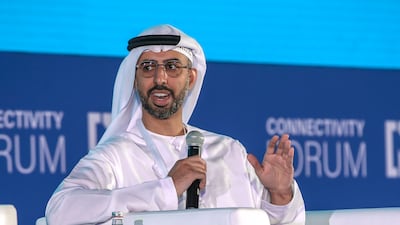Emirati minister Omar Al Olama has been named one of the 100 most influential people in artificial intelligence in a new Time magazine list, joining the likes of billionaire business magnate Elon Musk and Chat GPT creator Sam Altman.
Mr Al Olama has been at the forefront of the UAE's drive to unlock the potential of the advanced technology since being appointed the world's first AI minister in 2017.
The inaugural Time100 AI list shines a light on leaders, innovators, shapers and thinkers who are playing a crucial role in harnessing the cutting-edge tool.
Mr Al Olama, 33, who serves as Minister of State for AI, Digital Economy and Remote Work Applications, is included in the 'shaper' category.
In an interview with Time to mark his inclusion, the enterprising minister told how the Emirates was in a prime position to effect change in the sector on a global level.
"We understand that we are in a unique position," said Mr Al Olama.
"We are a medium-sized country; we have invested in AI for a few years now. So we were a bit far ahead of many other countries that are in this domain.
"We cannot compete with China and the US; I don’t think we ever will want to compete. Our job is to be first an enabler and to leverage our strength to support all the players when it comes to AI.
"So when our policymaking and our government is very agile and can move very quickly, we want to ensure that anyone who wants to deploy AI in a way where we can do it in a regulatory environment, the UAE comes first in mind and we’re able to then export whatever findings we have to the rest of the world.
"So in that sense, we complement the big players when it comes to this technology."
Mr Olama reflected on the pivotal role that artificial intelligence is set to play in society for years to come, stressing its importance requires ministries to be created to govern its use.
"AI technology is so profound that we can actually look back in history to understand why we need to create a ministry for it," he told Time.
"When humanity used to depend on coal and wood fire for energy, there was no ministry of energy. When it became paramount to actually ensure energy production and energy distribution, what happened is that every single government in the world appointed a Minister for energy.
"The same happened with telecommunications. I do believe that AI is at the same level."
Sheikh Mohammed bin Rashid, Vice President and Ruler of Dubai, hailed the minister's achievements in a message on social media.
He told of his pride in "every Emirati who has an achievement that raises the name of his country in front of the world with his excellence, work and contributions".
UAE leads the way on AI
The UAE's commitment to the field was further demonstrated when it established the Mohamed bin Zayed University of Artificial Intelligence in 2019.
The first batch of students to enrol at Abu Dhabi's artificial intelligence university graduated in January.
Last month, a new Abu Dhabi-developed artificial intelligence large language model for Arabic was unveiled, aiming to bring one of the world's most widely used languages into the AI mainstream.
Jais, an open-source bilingual Arabic-English model, was developed by Inception, a unit of Abu Dhabi AI company G42, Mohammed bin Zayed University of Artificial Intelligence and Silicon Valley-based Cerebras Systems.
In April, Dr Sultan Al Jaber, Minister of Industry and Advanced Technology and President-designate of Cop28, said the adoption of AI will help the Emirates achieve its economic diversification goals.
“Projections show AI solutions are on course to contribute an estimated $13 trillion to the global gross domestic product by 2030, optimising the industries of tomorrow and dramatically improving the lives of billions of people in the process,” Dr Al Jaber said during a visit to Mohamed bin Zayed University of Artificial Intelligence.









